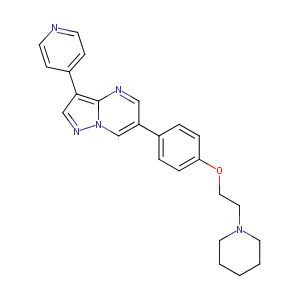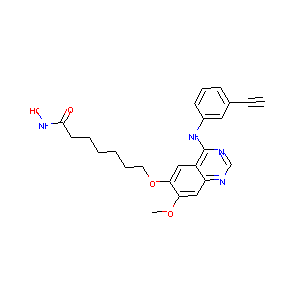| DOT Name |
DOT ID |
UniProt ID |
Mode of Action |
REF |
|
Cyclic AMP-responsive element-binding protein 1 (CREB1)
|
OT1MDLA1
|
CREB1_HUMAN
|
Increases Phosphorylation
|
[6] |
|
RAC-alpha serine/threonine-protein kinase (AKT1)
|
OT8H2YY7
|
AKT1_HUMAN
|
Increases Phosphorylation
|
[6] |
|
Forkhead box protein O1 (FOXO1)
|
OTPJRB6D
|
FOXO1_HUMAN
|
Decreases Expression
|
[7] |
|
Bone morphogenetic protein receptor type-1B (BMPR1B)
|
OTGFN0OD
|
BMR1B_HUMAN
|
Increases Expression
|
[8] |
|
Ubiquitin-like modifier-activating enzyme ATG7 (ATG7)
|
OTVT4YA1
|
ATG7_HUMAN
|
Increases Expression
|
[9] |
|
Serine/threonine-protein kinase Chk2 (CHEK2)
|
OT8ZPCNS
|
CHK2_HUMAN
|
Increases Phosphorylation
|
[10] |
|
Transferrin receptor protein 1 (TFRC)
|
OT8ZPBDL
|
TFR1_HUMAN
|
Decreases Expression
|
[8] |
|
Eukaryotic translation initiation factor 2 subunit 1 (EIF2S1)
|
OTM0GDTP
|
IF2A_HUMAN
|
Increases Phosphorylation
|
[11] |
|
Poly polymerase 1 (PARP1)
|
OT310QSG
|
PARP1_HUMAN
|
Increases Cleavage
|
[10] |
|
Apoptosis regulator Bcl-2 (BCL2)
|
OT9DVHC0
|
BCL2_HUMAN
|
Decreases Expression
|
[9] |
|
G2/mitotic-specific cyclin-B1 (CCNB1)
|
OT19S7E5
|
CCNB1_HUMAN
|
Decreases Expression
|
[10] |
|
Histone H2AX (H2AX)
|
OT18UX57
|
H2AX_HUMAN
|
Increases Phosphorylation
|
[10] |
|
Mitogen-activated protein kinase 3 (MAPK3)
|
OTCYKGKO
|
MK03_HUMAN
|
Decreases Phosphorylation
|
[9] |
|
Mitogen-activated protein kinase 1 (MAPK1)
|
OTH85PI5
|
MK01_HUMAN
|
Decreases Phosphorylation
|
[9] |
|
Bone morphogenetic protein receptor type-1A (BMPR1A)
|
OTQOA4ZH
|
BMR1A_HUMAN
|
Decreases Expression
|
[8] |
|
Cyclin-dependent kinase inhibitor 1 (CDKN1A)
|
OTQWHCZE
|
CDN1A_HUMAN
|
Increases Expression
|
[10] |
|
Serine/threonine-protein kinase mTOR (MTOR)
|
OTHH8KU7
|
MTOR_HUMAN
|
Increases Phosphorylation
|
[9] |
|
Caspase-3 (CASP3)
|
OTIJRBE7
|
CASP3_HUMAN
|
Increases Cleavage
|
[10] |
|
Caspase-9 (CASP9)
|
OTD4RFFG
|
CASP9_HUMAN
|
Increases Cleavage
|
[9] |
|
Small ribosomal subunit protein eS6 (RPS6)
|
OTT4D1LN
|
RS6_HUMAN
|
Increases Phosphorylation
|
[9] |
|
Hepcidin (HAMP)
|
OT607RBL
|
HEPC_HUMAN
|
Decreases Expression
|
[8] |
|
Apoptosis regulator BAX (BAX)
|
OTAW0V4V
|
BAX_HUMAN
|
Increases Expression
|
[10] |
|
Bcl-2-like protein 1 (BCL2L1)
|
OTRC5K9O
|
B2CL1_HUMAN
|
Decreases Expression
|
[9] |
|
Induced myeloid leukemia cell differentiation protein Mcl-1 (MCL1)
|
OT2YYI1A
|
MCL1_HUMAN
|
Decreases Expression
|
[9] |
|
Acetyl-CoA carboxylase 1 (ACACA)
|
OT5CQPZY
|
ACACA_HUMAN
|
Decreases Expression
|
[12] |
|
5'-AMP-activated protein kinase catalytic subunit alpha-1 (PRKAA1)
|
OT7TNF0L
|
AAPK1_HUMAN
|
Decreases Expression
|
[9] |
|
Serine-protein kinase ATM (ATM)
|
OTQVOHLT
|
ATM_HUMAN
|
Increases Phosphorylation
|
[10] |
|
Sequestosome-1 (SQSTM1)
|
OTGY5D5J
|
SQSTM_HUMAN
|
Decreases Expression
|
[9] |
|
Beclin-1 (BECN1)
|
OT4X293M
|
BECN1_HUMAN
|
Decreases Expression
|
[13] |
|
Endoplasmic reticulum membrane sensor NFE2L1 (NFE2L1)
|
OT1QHOS2
|
NF2L1_HUMAN
|
Decreases Expression
|
[12] |
|
Methylcytosine dioxygenase TET2 (TET2)
|
OTKKT03T
|
TET2_HUMAN
|
Decreases Expression
|
[9] |
|
Hemojuvelin (HJV)
|
OT4235J2
|
RGMC_HUMAN
|
Decreases Expression
|
[8] |
|
NAD-dependent protein deacetylase sirtuin-1 (SIRT1)
|
OTAYZMOY
|
SIR1_HUMAN
|
Decreases Expression
|
[14] |
|
Forkhead box protein P3 (FOXP3)
|
OTA9Z9OC
|
FOXP3_HUMAN
|
Decreases Expression
|
[9] |
|
Microtubule-associated proteins 1A/1B light chain 3B (MAP1LC3B)
|
OTUYHB84
|
MLP3B_HUMAN
|
Decreases Lipidation
|
[13] |
|
Transcription factor SOX-17 (SOX17)
|
OT9H4WWE
|
SOX17_HUMAN
|
Decreases Localization
|
[15] |
|
Transferrin receptor protein 2 (TFR2)
|
OTMYCCEO
|
TFR2_HUMAN
|
Decreases Expression
|
[8] |
|
Krueppel-like factor 2 (KLF2)
|
OTIP1UFX
|
KLF2_HUMAN
|
Decreases Expression
|
[16] |
|
Cellular tumor antigen p53 (TP53)
|
OTIE1VH3
|
P53_HUMAN
|
Increases Response To Substance
|
[10] |
| ------------------------------------------------------------------------------------ |
|
|
|
|


